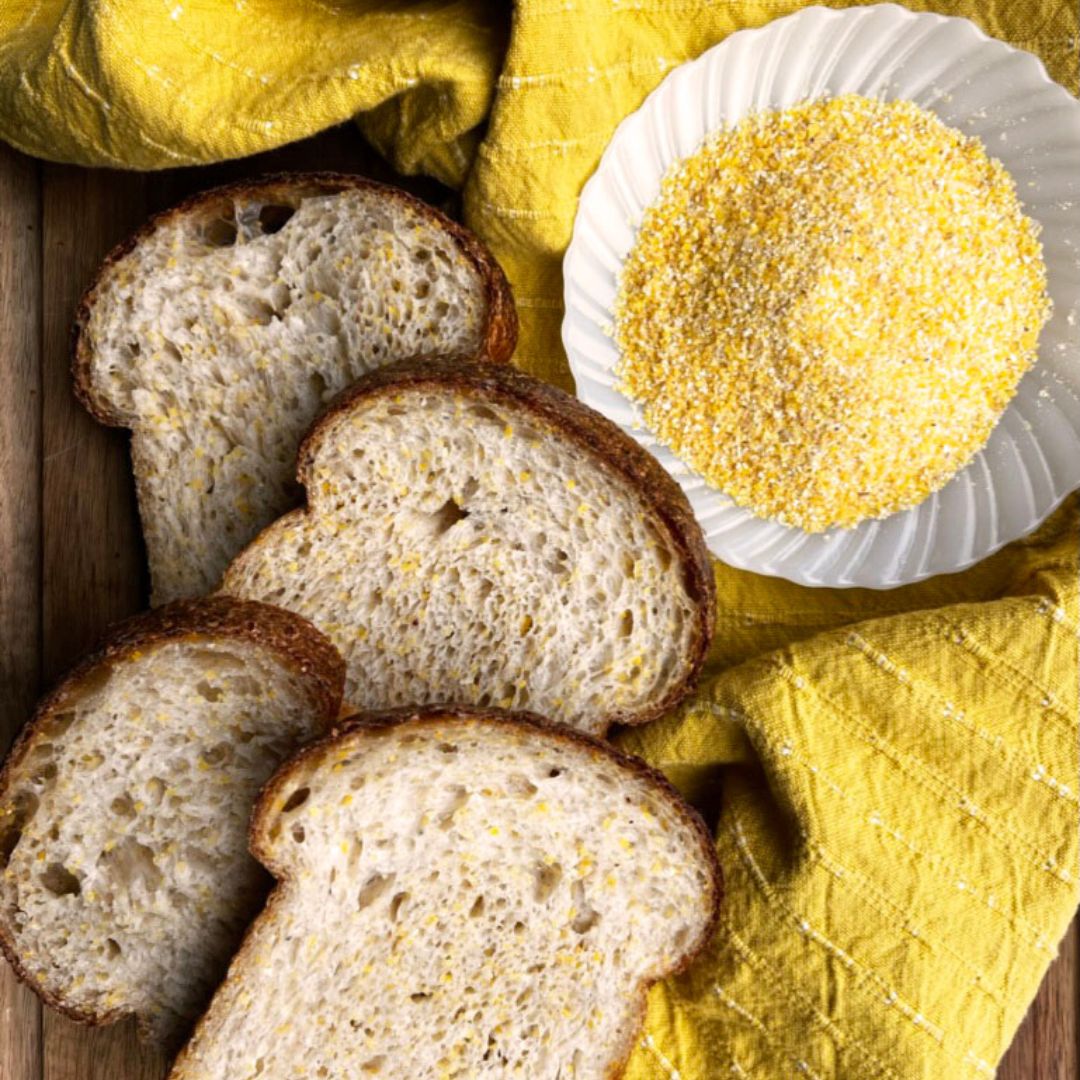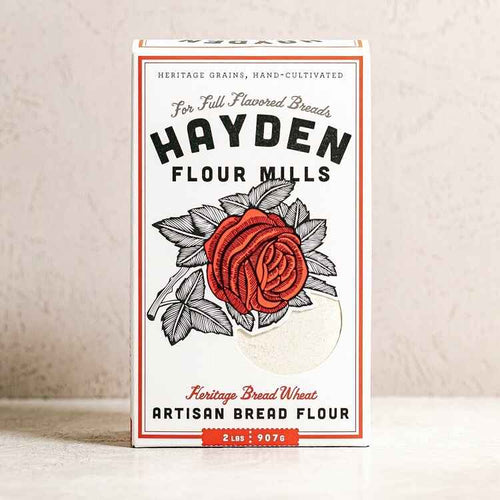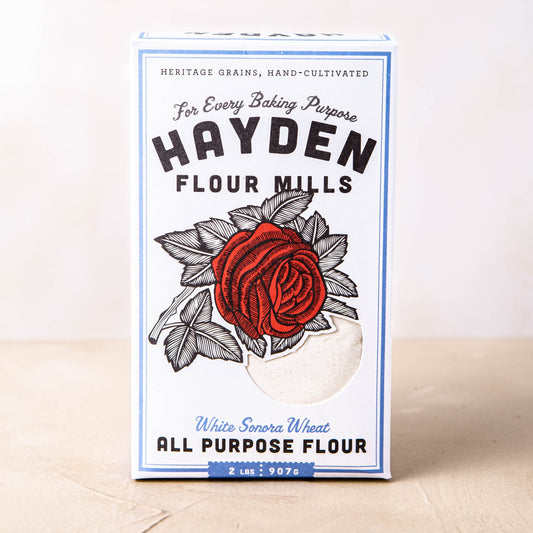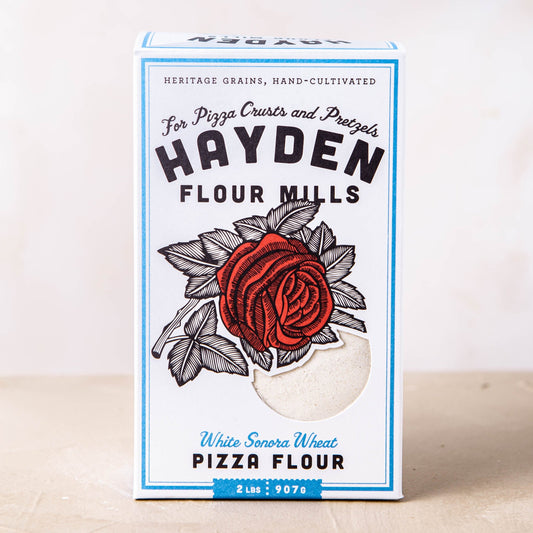What You'll Need
Tools
Kitchen scale
Electric Mixer with Dough Hook Attachment
Mixing bowl
Dough scraper
2 Tin loaf pans (9x5)
Levain
50 grams Artisan Bread Flour
50 grams water
30 grams ripe sourdough starter
Autolyse
1,000 grams Artisan Bread Flour
600 grams water
Porridge Element
170 grams Yellow Corn Polenta
400 grams water
Slurry
Levain (from above)
50 grams buttermilk
50 grams honey
20 grams salt
Herbs
4 teaspoons fresh rosemary, chopped
4 teaspoons garlic, minced
Egg wash
Splash of milk
1 egg
Directions
Desired dough temperature: 78°F
Prepare the levain (8 am)
To make the levain, mix the levain ingredients in a jar and leave them covered at a warm temperature, 74-76°F, to ripen for 4 hours.
Make Porridge Element (11 am)
Bring water to a boil. Add Polenta to water. Stir constantly until the water evaporates. Let Polenta completely cool. Set aside to cool for 1 hour uncovered.
Autolyse (12pm)
Using dough whisk, combine Autolyse ingredients together, making sure there are no dry bits. This dough will seem loose and shaggy. Cover to allow dough to hydrate for about 1 hour.
Make Main Dough (1 pm)
In a small bowl, thoroughly mix together the slurry ingredients, set aside.
In the bowl of a stand mixer fitted with the dough hook attachment, combine the autolyse and the slurry and the Polenta Porridge. Mix on medium speed until the dough comes together. This step should take 4-5 minutes. Set aside to rest for 10 minutes.
At this point, add the herbs. With the mixer on low sprinkle the Rosemary and Garlic into the dough. Let the mixer mix these herbs into the dough for 2-3 minutes or until fully incorporated.
Bulk Fermentation (1:15 pm - 5:15 pm)
Transfer the dough to a bulk fermentation container and cover.
This dough will require 4 sets of stretches and folds during bulk fermentation. After the first 30 minutes, wet your hands, grab one side of the dough, and lift it up and over to the other side. Rotate the bowl 180 degrees and repeat. Then rotate the bowl a quarter turn and stretch and fold that side. Rotate the bowl 180 degrees again and finish with a stretch and fold on the last side. The dough should be neatly folded up in the bowl.
Cover and repeat these folds 3 more times, at 30 minute intervals.
After the 4th stretch and fold, allow the dough to rest, covered with a damp tea towel, for the remainder of bulk fermentation.
Divide and preshape (5:15 pm)
Scrape the dough onto a clean counter. Divide the dough into 2 equal pieces and pre-shape the pieces into loose rounds.
Cover with a damp tea towel and let the dough rest for 30 minutes.
Shape (6 pm)
Lightly flour the tops of the dough masses. Pulling the dough toward your body to build final tension. Let rest a couple of minutes.
Meanwhile butter your Tin Loaf Pans.
Flip each round and shape into a Swiss roll shape and place seam side down in buttered Tin. Cover with plastic wrap.
Overnight Cold Fermentation (6 pm - 8 am)
Place covered doughs in refrigerator overnight. The doughs will slowly rise and develop flavor.
Bake (8 am)
Turn the oven to 430 degrees F.
Meanwhile pull the doughs out of the refrigerator. Place on countertop at room temperature. Let warm up for one hour while the oven heats up.
Mix together 1 egg with a splash of milk. Mix and brush egg wash on loafs.
Place both loafs on middle rack in oven. Bake at 430 degrees F for 15 minutes then lower temperature to 410 degrees F and bake for 40 minutes, rotating half way through.
Let completely cool on wire rack (at least 2 hours).
Share and enjoy!
Makes 2 loaves.
Recipe contributed by A Sourdough Story









